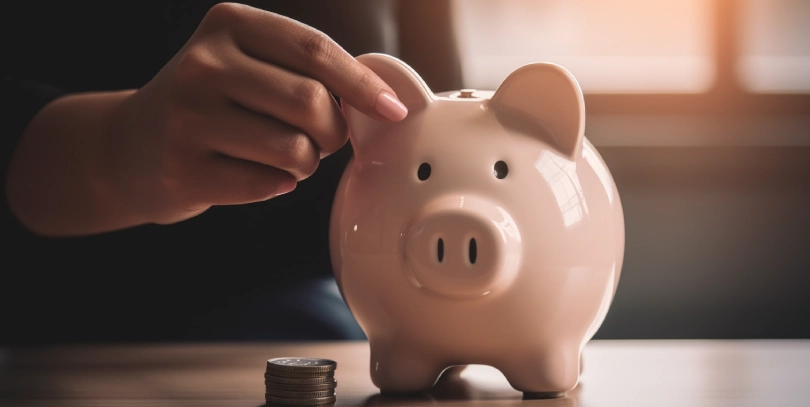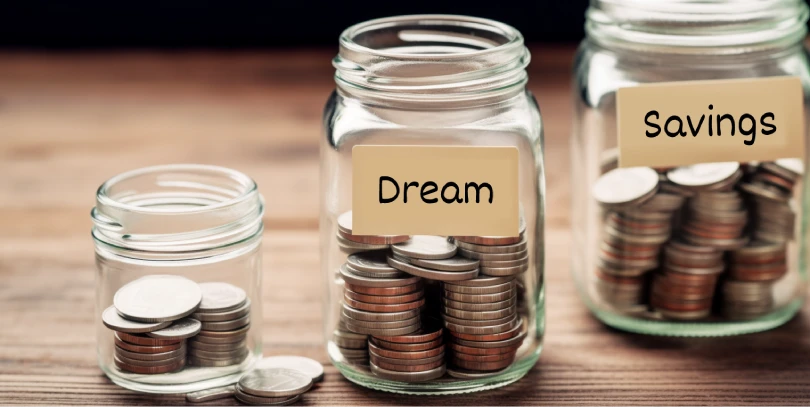16 Ways to Save Money on Impulse Purchases

Tired of ending every month in the red and not knowing where your hard-earned money went? You want to do better, but yet another impulsive purchase prevents you from spending money wisely or simply saving it.
The truth is, you don’t need everything to fall magically into place before you start saving money. If you wait for the “right moment,” it will never come. The best time to start saving is right now.
The good news is that there are many simple ways to save money by avoiding spontaneous expenses.
Why should I spend less money?
The main indicator of financial success and freedom is the ability to have extra money left over at the end of the month.
Without it, you can’t do things like pay off debt, invest in the future, or save for major financial goals.
When you have money in your bank account, you can avoid credit card debts, monthly payments, and overall financial stress.
Moreover, if you want to have a good relationship with money, it will be much easier when you don’t have to juggle bills and live paycheck to paycheck.
In general, spending less money solves a lot of problems.
16 Practical ways to save money

1. Cut down on your grocery expenses
After making a budget, most people are shocked to find out how much they spend at grocery stores each month. Marketers in stores do everything to make you impulsively grab that attractive box of sweets. And as you head to the checkout, you might pick up your favorite snacks along the way, topped off with small treats at the register.
The main budget buster is small purchases. It seems that for a small price, you can easily afford another pack of cookies. But over the month, these small expenses add up to a not-so-small sum.
Save money on groceries by planning meals for the week and carefully checking what you already have before going to the store. After all, why buy more of what you already have?
2. Avoid emotional purchases when you’re in a bad mood
There are times when we shop to feel better, often justifying it as a reward after a hard month or a stressful situation. Yes, you’ll feel better, but only for a short time. In a few days, you’ll be horrified by how much money was wasted.
Shopping is an expensive way to get positive emotions. Replace impulsive purchases with other things that can improve your mood.
If you’re feeling sad, talk to a friend, watch an interesting movie. If you’re stressed, go for a walk, do some sports, or work on improving your home.
3. Don’t go shopping when you’re bored
Sometimes, you might go shopping out of boredom. Initially, you think you’ll just window shop and return home. But boredom plays a significant role in the impulsiveness of shopping. For example, you might want to try on or test an item. Then a salesperson tells you how great those pants look on you, and you can’t resist buying them.
When you’re bored, engage in something you’ve always wanted to try. Boredom arises when you have free time. Maybe it’s a great opportunity to learn something new or engage in a favorite activity.
4. Cancel automatic subscriptions
Canceling various digital subscriptions can help you avoid spending money unnecessarily each month. If you’ve set up regular payments, you might not notice how money slips from your wallet.
5. Don’t create accounts in online stores
Cancel all subscriptions that you don’t use regularly. Check that automatic renewal is turned off when you make a purchase. If you think you can’t do without it, you can resubscribe – but only if it fits your revised budget.
Creating an account in online stores allows companies to manipulate us. We receive special offers and discounts that are “too good to miss.” Reading such emails every day, we will eventually click the button and buy something. After all, purchases are now possible with just one or two clicks.
Moreover, online stores offer us products we have previously searched for. Therefore, we will be interested in them. If you find it hard to control all impulsive purchases, don’t create an account. That way, you’ll have to fill in details like your address and credit card every time. I’m sure you won’t want to go through this operation every time.
But if you still start entering your data, your brain will have time to analyze the situation, and you will make a rational purchase decision.
6. Buy generic items
The easiest way to save money is to skip brands. In most cases, the only thing that distinguishes them from alternatives is marketing hype. And of course, the packaging – just look at that box! The logo is so beautiful and stylish! However, that’s all you get for your money.
7. Save money automatically
Now you can save money without even thinking about it. Set up your bank account to automatically transfer funds from your salary card to your savings account.
Set a certain percentage of each salary to be saved. I recommend starting at 10% to 20%. This allows you to passively accumulate money, preventing you from spending it all.
If your bank doesn’t offer a savings account, then stick to the rule of transferring part of your money to another card or withdrawing cash with each salary.
8. Shop with a list
When you have a list, you set a goal for what you need to buy. With a detailed list, the likelihood of buying something unnecessary decreases. You create a rule for yourself that helps avoid unplanned purchases.
9. Spend additional or unexpected income wisely
When you receive a pleasant work bonus, inheritance, or any other unexpected income, use it wisely. It’s an additional opportunity to try something new, useful, or to develop your skills and hobbies.
If you have debts, it’s better to use these funds to pay them off or to pay down your credit card balance. This allows you not to delay saving money for later.
If you have no debts, use these extra funds to create an emergency fund.
10. Return items you bought on impulse
Often, impulsive purchases turn out to be unnecessary items. If you bought something on impulse and already regret it, don’t hesitate to return it. All stores have a return policy. Don’t be afraid to return an unwanted purchase, even if the salesperson looks at you disapprovingly. Returning goods is your legal right!
11. Avoid friends and acquaintances who squander money
We often ask our friends to go shopping with us to get their advice. However, we realize that such people might be prone to flattery and say everything we try on looks good. This can lead to situations where we buy things that don’t really suit us, wasting our money unnecessarily.
12. Buy only what you need
The difference between planned purchases and impulsive ones is that we believe we really need the item. However, sometimes it turns out to be useless and forgotten after some time.
To avoid such a situation, you need to ask yourself a few questions:
- Why do I need this item?
- How often will I use it?
- What needs will it satisfy?
By answering these questions, you can assess whether the purchase is truly necessary for you. If you have doubts about any of the questions but still believe it’s necessary, try to find a cheaper alternative.
13. Check reviews and compare prices
If you are planning to buy an expensive item, make sure to read user reviews to avoid falling for marketing tricks and buying something you don’t actually need. Pay attention to both positive and negative reviews to get real information and make an informed choice.
It’s also a good idea to compare prices for the same product in different stores. It’s completely normal for prices to vary in different places. So, before making a purchase, research several options and choose the one that offers the best balance of price and quality.
14. Ponder expensive purchases
If you are planning to make an expensive purchase, don’t rush into it immediately. Give yourself a few days to think it over. Over time, you may change your mind or simply forget about what you wanted to buy. This approach will help you avoid impulsive spending and make a more considered choice.
15. Think about what you already have when you go shopping
Imagine you spot a beautiful shirt with a vibrant floral pattern, and it’s on sale. It seems like a tempting offer. But before buying it, consider whether you really need another shirt in your collection, especially if you already have several similar items. Reflecting on this question will help you avoid impulsive purchases and save your finances.
16. Sell anything that doesn’t bring you joy
Free your home from unnecessary items to improve your financial situation in the future. Reevaluate the need to keep an old chair given by your aunt and a crystal vase you found at an antique store. You may not even notice many useless items taking up space in your home. Try selling them, and you may get money that can help you overcome financial difficulties and stop living from paycheck to paycheck.
Ways to stop unnecessary spending

Sometimes, even the above-mentioned tips may not help you avoid unnecessary spending. If it has become a habit, you need to reconsider your financial mindset.
Make a list of 5 purchases you regret
This list will help you change your mindset. You’ll remember the purchases where you spent a lot of money but didn’t find satisfaction. Write down the list and keep it in your wallet. Every time you’re tempted to make an impulsive purchase, the list will remind you of your goals.
Find the reason behind impulsive purchases
Think back to how it all started. What emotions did you feel when you began making impulsive purchases? Knowing the reason can help you work through it and find a solution to the unresolved issue.
Turn saving into a game
When you successfully avoid an impulsive purchase, write it down on paper. Also, note how much money you saved. Put the list in a box where you keep records of your financial achievements. At the end of the month, tally up how much you’ve saved. You’ll be pleasantly surprised at how much you’ve accumulated, which you can spend on useful things.
Conclusion: How to start saving money
You will begin saving money when you adopt healthy financial habits and prioritize your future needs over your current desires—in other words, when you make saving money your priority. So, do it! You can break the cycle of living from paycheck to paycheck with a simple secret: create a budget before the start of each month.
A budget is all about being goal-oriented. It helps you create a plan so you can see where your money is going and determine how much you can realistically save each month. When you budget, you assign a specific job to your money before you save or spend it. Remember: it doesn’t matter how much money you earn; what matters is how you spend and save your hard-earned money.
